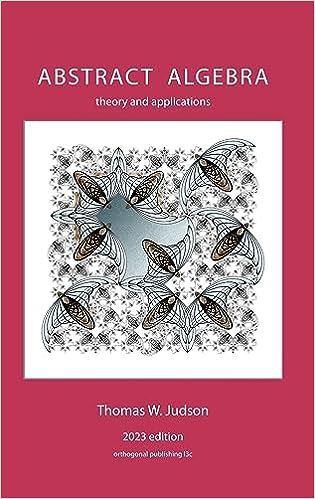Exercises 17.5 Exercises
2.
Compute each of the following.
3.
Use the division algorithm to find \(q(x)\) and \(r(x)\) such that \(a(x) = q(x) b(x) + r(x)\) with \(\deg r(x) \lt \deg b(x)\) for each of the following pairs of polynomials.
4.
Find the greatest common divisor of each of the following pairs \(p(x)\) and \(q(x)\) of polynomials. If \(d(x) = \gcd( p(x), q(x) )\text{,}\) find two polynomials \(a(x)\) and \(b(x)\) such that \(a(x) p(x) + b(x) q(x) = d(x)\text{.}\)
-
\(p(x) = x^3 - 6x^2 + 14x - 15\) and \(q(x) = x^3 - 8x^2 + 21x - 18\text{,}\) where \(p(x), q(x) \in {\mathbb Q}[x]\)
-
\(p(x) = x^3 + x^2 - x + 1\) and \(q(x) = x^3 + x - 1\text{,}\) where \(p(x), q(x) \in {\mathbb Z}_2[x]\)
-
\(p(x) = x^3 + x^2 - 4x + 4\) and \(q(x) = x^3 + 3 x -2\text{,}\) where \(p(x), q(x) \in {\mathbb Z}_5[x]\)
-
\(p(x) = x^3 - 2 x + 4\) and \(q(x) = 4 x^3 + x + 3\text{,}\) where \(p(x), q(x) \in {\mathbb Q}[x]\)
5.
Find all of the zeros for each of the following polynomials.
6.
Find all of the units in \({\mathbb Z}[x]\text{.}\)
7.
8.
Which of the following polynomials are irreducible over \({\mathbb Q}[x]\text{?}\)
-
\(\displaystyle x^4 - 2x^3 + 2x^2 + x + 4\)
-
\(\displaystyle x^4 - 5x^3 + 3x - 2\)
-
\(\displaystyle 3x^5 - 4x^3 - 6x^2 + 6\)
-
\(\displaystyle 5x^5 - 6x^4 - 3x^2 + 9 x - 15\)
9.
10.
11.
Prove or disprove: There exists a polynomial \(p(x)\) in \({\mathbb Z}_6[x]\) of degree \(n\) with more than \(n\) distinct zeros.
12.
13.
Show that the division algorithm does not hold for \({\mathbb Z}[x]\text{.}\) Why does it fail?
14.
Prove or disprove: \(x^p + a\) is irreducible for any \(a \in {\mathbb Z}_p\text{,}\) where \(p\) is prime.
15.
Let \(f(x)\) be irreducible in \(F[x]\text{,}\) where \(F\) is a field. If \(f(x) \mid p(x)q(x)\text{,}\) prove that either \(f(x) \mid p(x)\) or \(f(x) \mid q(x)\text{.}\)
16.
17.
Let \(F\) be a field and \(a \in F\text{.}\) If \(p(x) \in F[x]\text{,}\) show that \(p(a)\) is the remainder obtained when \(p(x)\) is divided by \(x - a\text{.}\)
18. The Rational Root Theorem.
Let
\begin{equation*}
p(x) = a_n x^n + a_{n - 1}x^{n - 1} + \cdots + a_0 \in \mathbb Z[x]\text{,}
\end{equation*}
where \(a_n \neq 0\text{.}\) Prove that if \(p(r/s) = 0\text{,}\) where \(\gcd(r, s) = 1\text{,}\) then \(r \mid a_0\) and \(s \mid a_n\text{.}\)
19.
Let \({\mathbb Q}^*\) be the multiplicative group of positive rational numbers. Prove that \({\mathbb Q}^*\) is isomorphic to \(( {\mathbb Z}[x], +)\text{.}\)
20. Cyclotomic Polynomials.
The polynomial
\begin{equation*}
\Phi_p(x) = \frac{x^p - 1}{x - 1} = x^{p - 1} + x^{p - 2} + \cdots + x + 1
\end{equation*}
for \(p\) prime is called the cyclotomic polynomial. Show that \(\Phi_p(x)\) is irreducible over \({\mathbb Q}\) for any prime \(p\text{.}\)
21.
If \(F\) is a field, show that there are infinitely many irreducible polynomials in \(F[x]\text{.}\)
22.
Let \(R\) be a commutative ring with identity. Prove that multiplication is commutative in \(R[x]\text{.}\)
23.
Let \(R\) be a commutative ring with identity. Prove that multiplication is distributive in \(R[x]\text{.}\)
24.
Show that \(x^p - x\) has \(p\) distinct zeros in \({\mathbb Z}_p\text{,}\) for any prime \(p\text{.}\) Conclude that
\begin{equation*}
x^p - x = x(x - 1)(x - 2) \cdots (x - (p - 1))\text{.}
\end{equation*}
25.
Let \(F\) be a field and \(f(x) = a_0 + a_1 x + \cdots + a_n x^n\) be in \(F[x]\text{.}\) Define \(f'(x) = a_1 + 2 a_2 x + \cdots + n a_n x^{n - 1}\) to be the derivative of \(f(x)\text{.}\)
-
Prove that\begin{equation*} (f + g)'(x) = f'(x) + g'(x)\text{.} \end{equation*}Conclude that we can define a homomorphism of abelian groups \(D : F[x] \rightarrow F[x]\) by \(D(f(x)) = f'(x)\text{.}\)
-
Suppose that we can factor a polynomial \(f(x) \in F[x]\) into linear factors, say\begin{equation*} f(x) = a(x - a_1) (x - a_2) \cdots ( x - a_n)\text{.} \end{equation*}Prove that \(f(x)\) has no repeated factors if and only if \(f(x)\) and \(f'(x)\) are relatively prime.
26.
27.
28.
Let \(R\) be a commutative ring with identity. Show that \(R[x]\) has a subring \(R'\) isomorphic to \(R\text{.}\)
29.
Let \(p(x)\) and \(q(x)\) be polynomials in \(R[x]\text{,}\) where \(R\) is a commutative ring with identity. Prove that \(\deg( p(x) + q(x) ) \leq \max( \deg p(x), \deg q(x) )\text{.}\)

